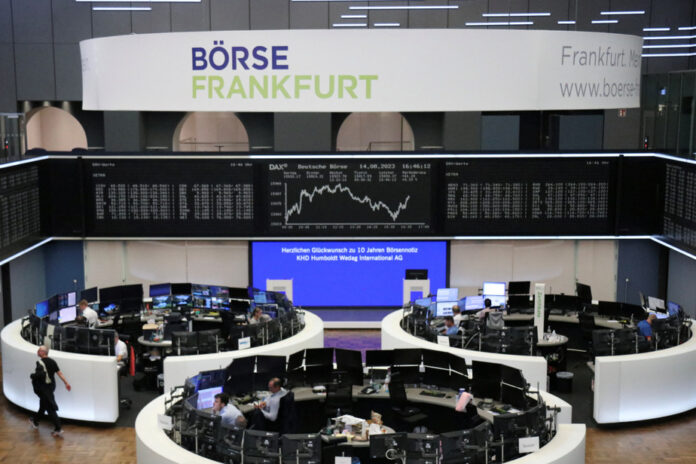(Paris) World stock markets are moving lower on Tuesday, driven by disappointing macroeconomic indicators, a rise in bond yields and rising oil prices after announcements from Saudi Arabia, the world’s largest exporter.
Wall Street, which is having its first session of the week after a holiday the day before, was in the red around 12:05 p.m. (Eastern time): the NASDAQ dropped 0.13%, the S
The Paris Stock Exchange ended down 0.34%, as did Frankfurt. London ended down 0.20%, holding up a little better, with commodities weighing more heavily in its index composition.
Oil prices have indeed climbed after the announcement of an extension of the production cut from Saudi Arabia and exports from Russia until the end of 2023, peaking at their highest levels since November.
Around 12 p.m. EST, a barrel of Brent North Sea crude for November delivery was up 2.26% at $91.01.
Its American equivalent, a barrel of West Texas Intermediate (WTI) for October delivery, gained 2.74% to 87.89 dollars.
However, “rises in oil prices are fueling inflation fears,” said JP Morgan analyst Vincent Juvyns, which is straining investors as several central banks are set to make monetary policy decisions in September.
Market attention also focused on “poor PMI indicators” which confirmed the slowdown in the European economy, notes the analyst.
The indicator for the French private sector has been revised down to its “strongest rate of contraction” in almost three years, according to S
In Spain, Italy and the Eurozone, slight downward revisions have been the norm.
“So there is a salvo of bad news, both on growth and on inflation,” adds Vincent Juvyns.
With such a slowdown, investors hope that the European Central Bank (ECB) will put an end at its meeting on September 14 to its series of hikes in key rates, its main tool to fight against inflation, but whose consequences are heavy on the economy.
The prospect of another rate hike raises concerns “because it is likely to make an already difficult situation worse” and drag “the euro down,” said CMC Markets analyst Michael Hewson.
Across the Atlantic, the US Federal Reserve (Fed) will meet on September 19 and 20.
At the same time, on the bond market, around 12 p.m. (Eastern time), the interest rate on the two-year US debt, the most sensitive to monetary policy expectations, rose to 4.94% from 4. 88% at last close. The yield on the 10-year Treasury note stood at 4.25% compared to 4.18%.
The interest rate on the German 10-year loan rose to 2.61%, against 2.58 the day before.
Germany’s second largest bank Commerzbank (-6.10%) fell after a Barclays rating downgraded the stock to “underweight”, dragging rival Deutsche Bank (-2.96%) lower.
Retail companies have suffered particularly in Europe after the publication of a sector note by JPMorgan analysts who are revising their recommendation on most groups downwards.
Ahold Delhaize dropped more than 6%, Tesco 2.84% and Carrefour 2.19%.
The US dollar climbed against the euro and the British pound on Tuesday, taking advantage of its safe haven status and investor risk aversion. The euro was down 0.63% at $1.0728 around 12 p.m. ET.
Bitcoin was down 0.35% at $25,737.















